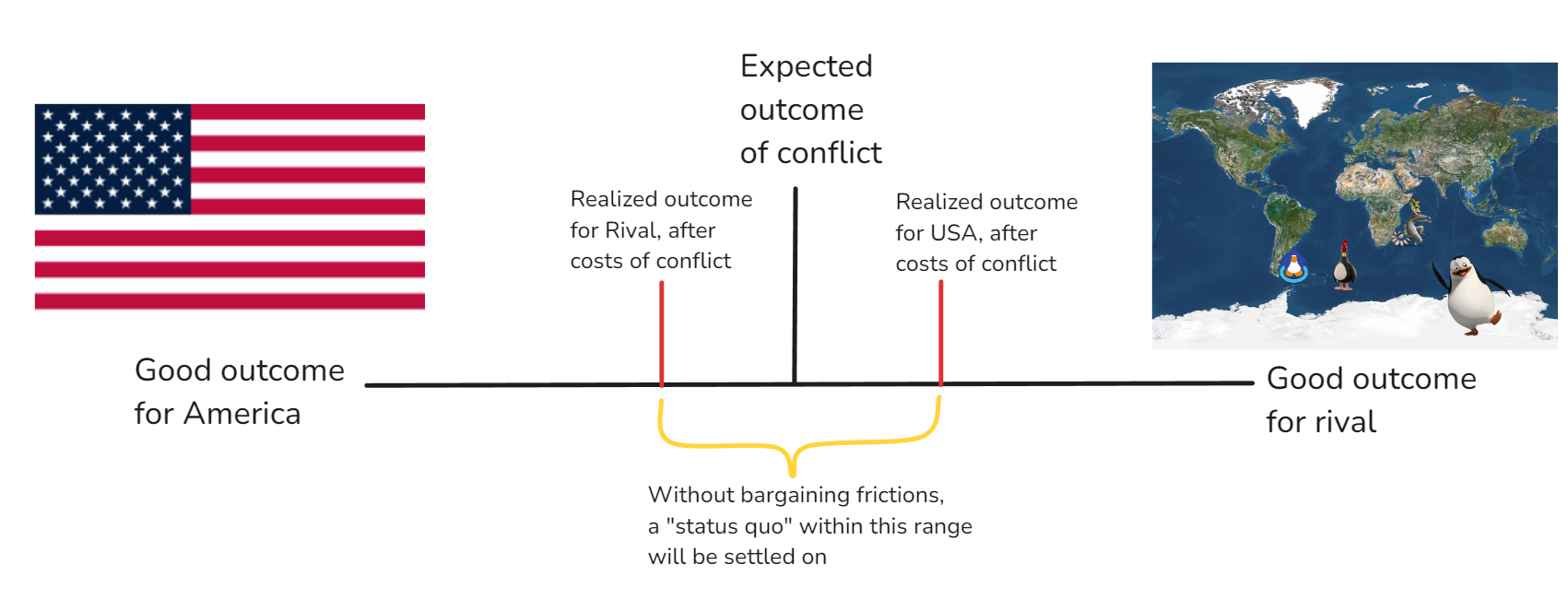It seems obvious that groups go to war when they believe there are some spoils that are more valuable than the costs they expect to incur. However, there is one other component that is necessary for a war to occur: A bargaining friction. Two rational actors with perfect information will mutually prefer to settle on an outcome preferable to the expected outcome of war, minus costs:

A bargaining friction occurs when there is disagreement between the expected outcome of conflicts between the two parties, or the costs of war. Historically, our Neoliberal “More trade good” trading policy produced very few trade wars: We view the costs of such conflict as high, as any reduction in trade is understood to harm all parties. And we imagined the benefits would be low – that trying to extract or extort a few pennies on the dollars would, in the long run, be worth less than having prosperous neighbors and allies who were highly productive and able to contribute to a flourishing world economy. We have historically not been too concerned with trade deficits: When we give someone 100 green paper dollars for $100 worth of steel, we have both gotten richer. For us to make that transaction, both parties would need to agree that it was mutually beneficial.
What changed with Donald Trump? Donald has been repeating constantly that we have been getting screwed, pillaged, looted. That our allies have been unfair to us. He has stated constantly that he sees a trade deficit of 200 billion dollars as evidence that Canada is “getting over on us” for $200b. If we take him at his word, the problem reveals itself: Donald Trump may sincerely believe that when we hand someone 100 green paper dollars for $100 worth of steel, that they are “stealing” 100 dollars from us. If so, this creates a 1.2 trillion dollar bargaining friction between us and the nations we hold trade deficits with – a 1.2 trillion dollar mismatch between expectation and reality. An otherwise rational Trump, holding this belief, would be foolish not to go to war with… the entire rest of the world.
The way Donald’s tariffs were calculated was by taking the “profits” the other nations make from our arrangement – their trade deficits – and tariffing them for half that amount. In his mind, he is being generous: Splitting the value they are extracting from our joint venture 50/50. He is not just being reasonable, in his mind he is being downright generous – America is the one “holding the cards” after all.
There are alternative hypotheses for why he is choosing the current path. If we see him ease tariffs on specific industries, it would bolster the theory his primary goal is to create leverage against American companies. And a negotiation tactic does not explain why significant tariffs were placed on small nations like Vanuatu, Madagascar, or the Falkland islands. But the idea that he is trying to “meet countries in the middle” seems, currently, as the best explainer of all of the decisions made thus far.
If this is the case, it is a dire prediction. Negotiations should be expected to peter themselves out, and be responsive to reality as the markets continue to plunge. But if it is the case that Trump is under the influence of a trillion-dollar bargaining friction, we should expect him to stay the course, or open up new fronts in the war if he is forced to step back from this one. The only long-term solution to the crisis would require the leader of the United States to rectify their beliefs with reality – and Trump is not someone to admit he made a mistake.
There is a more reliable way to correct this disconnect: Impeachment. It seems like a pipe dream today, but the market was down 5% when I started this draft, and is down 10% as I wrap up. What happens if it drops another 10% over the next month or two? What happens if he continues his trend of weekly scandals for 6 more months? There is a limit to how much damage he can do to society before republicans and independents begin, slowly, to turn on him. Slowly, slowly, and then all at once – when his allies begin to realize the ship is sinking and abandon him.

The scenario I describe seems unlikely – Republicans have only gotten more loyal to him over the past 10 years, not less, and seem less responsive than ever to their constituents. But if there is even a small chance he can be impeached, it is our duty to fight for those odds – and we are not alone. The groundwork is being laid out by nation wide volunteers with “Operation anti king”. The first and earliest step will be to figure out where we stand by reaching out to every rep in the country over the next week and determining where everyone stands. This will take 20 minutes, and volunteers are needed for 30% of Congressional districts.
You spend a dozen hours a week consuming political content – if you have 20 minutes to spare, we need all the hands we can get. Join the DGG political action server today.